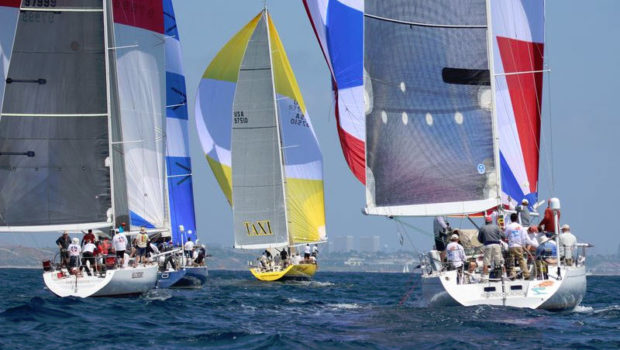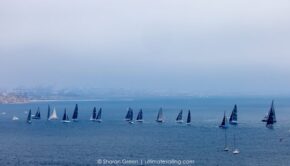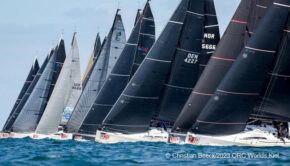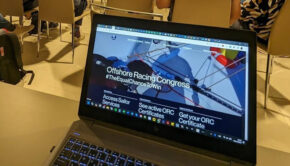Rating System for North American Market
Published on March 28th, 2017
Managed by the Offshore Racing Association (ORA) in the USA, the Offshore Rating Rule (ORR) seeks to handicap different designs of keelboats to allow them to race together. Scuttlebutt editor Craig Leweck checks in with Bjorn R. Johnson, Executive Director ORA, for this update.
What is the state of ORR?
When you refer to the state of ORR, the scope should also include ORR-ez. The two systems are compatible and EZ is a less granular version of ORR, less expensive for the owner and uses the same Velocity Prediction Programs (VPP).
ORA has seen tremendous growth in both these products in 2016 compared to prior years and is xpecting ORR and ORR-ez to grow again in 2017. Organizing authorities like ORR since it is very customizable to their needs and we are finding from the owners comments that they really like the racing under ORR and ORR-ez.
Currently ORR is used in USA, Canada, Mexico and Bermuda and we have been getting inquiries from Asia and Europe about using ORR for their fleets. So things are looking very bright.
Any trends you have observed?
At ORA we are seeing handicap racing beginning to move back to more traditional sailing courses which contain some reaching legs and point to point courses are gaining in popularity. The move is away from the windward/leeward racing we have seen for the past 25+years.
‘Adventure Sailing’, as some of the longer distance races have been called, is taking hold once again. ORR and ORR-ez can take into account the historical data of a particular race and/or factor in the percentage of beating, running, reaching for a given course to give a much more precise and fair ratings to all of the competitors. The racing becomes more fun when everyone has a fair chance to place, if they sail well.
The US has a lot of rating rules. Do they need them all?
That is a tough question. It all depends from where you sit in the grand scheme of things. Having raced and campaigned many of my own boats, I have seen the diversity of the rating systems first hand. In the USA we have a capitalist economy and that allows us to have choices and make our own decisions.
There are supporters for single number rules, VPP Rules, “International Rules”, and inexpensive observed performance systems. This sensitivity to the needs of the market provides owner value with the ability to race an older design competitively against a newer design. The ability to give fair ratings to a diverse age range of designs keeps people in the sport longer and can attract entrants from a larger pool of boats for race organizers.
The PHRF system can be interlaced with politics in establishing ratings, which again can drive people away from big boat racing. ORA’s products, ORR and ORR-ez, were specifically developed with the North American market in mind, and fill the needs that competitors and organizing authorities want in handicap rating systems.
What sets ORR apart from other rating rules?
The ORR philosophy is “bring the boat you have or build the boat you want and we will give you the fairest rating possible”. Being a broad based rule, ORR can fairly rate a wide variety of boats and can attract boats from a wide and diverse market, which in turn helps the race organizers get more boats to the starting line.
There is always a lot of PR surrounding the much overused term “transparency” in VPP rules; the fact is that no VPP rule is completely transparent with its thousands of lines of source code. ORR is a limited access rule, unlike the supposed “transparent rules”.
ORR limits the number of trial runs that a designer or owner can make to test against the rule which makes it tougher to “game the system” and to optimize. IRC follows the same protocols and those protocols seem to be working well for both systems. Grand Prix racing is sailed in ORR and IRC, both of which are limited access handicap systems.
Organizing authorities and owners like the racing these limited access rules provide. In point of fact, if you look at the winners from this year’s ORR Championship Series, you will see a wide variety of new and older designs winning under ORR, from TP 52’s to Beneteau 42’s. It shows the robustness of the system.
Tell us about the VPP.
ORA, an Illinois Corporation, is the owner of ORR and the ORR VPP. ORA has a contractual agreement with US Sailing to process ORR Certificates, produces Polar Performance Packages in concert with Jim Teeters (ORA Technical Director), processes ORR-ez certificates and has a business relationship with the International Super Yacht Rule (ISYR). Sale of these products and agreements represent the major parts of the business model and provide general financial support.
For research and development and for educational projects, ORA looks for interested donors or sponsors. The organization is very lucky in that all of our Board members have contributed monetarily toward ORA/ORR support as well as donating their time and valuable expertise. ORA also makes applications for grants, or has partnered with corporate entities for support.
Any advances ORA makes in handicapping improvements that don’t violate the confidentiality of the ORR VPP are shared with the entire sailing community. ORA recently received a research grant from the Cruising Club of America (CCA) and part of the agreement is the publication of any findings that will benefit the sailing/racing community without violating any of the CCA-ORA confidentiality agreements.
The founding clubs of ORA – Cruising Club of America, Transpacific Yacht Club and the Chicago Yacht Club – use ORR for their distance races. Does ORR shine brighter as an offshore rule than an inshore rule?
ORR is currently used in many events in North America which are as varied and diverse as the competitors themselves. ORR is primarily known for being used in offshore events, but works equally as well for inshore racing. The marketplace is showing an increased interest in point to point racing or including reaching legs for inshore events. ORR can accommodate those needs easily with its ability to customize its wind mix.
What are the costs to boat owners?
ORA works closely with US Sailing in establishing ORR Certificate fees. All the measurement data and certificates are processed by US Sailing. ORA processes ORR-ez certificates internally and charges $100.00 for a new certificate and $75.00 for a revalidation.









 We’ll keep your information safe.
We’ll keep your information safe.